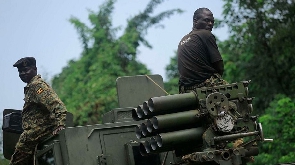 A file photo of some soldiers sitting on a missile launcher
A file photo of some soldiers sitting on a missile launcher
I begin with a cautionary tale: in 1956, Britain, in collusion with France and Israel, invaded Egypt to seize control of the Suez Canal.
Britain had hitherto operated the Canal through a “Suez Canal Company” that Britain had established in the heydays of British imperialism.
The reason for the invasion? Egypt, under President Gamal Abdul Nasser, had dared to nationalise the Suez Canal!
Now, in those days, if a “developing country” nationalised a company from which the Western countries reaped a lot of profit, the action was conveniently interpreted in the West as a declaration that the country in question wanted to “go Communist”.
Yes, those were the days of the “Cold War”, and no matter what patriotic arguments a “developing country” advanced for nationalising a Western-controlled company, the “nationalization” was taken as a first step towards taking sides – in favour of the Soviet Empire – in the Cold War.
But surprise, surprise, in the case of the Suez Canal, the United States, the undisputed leader of the anti-Communist bloc, did not support the action taken by Britain, in collusion with the two other allies of the US – France and Israel.
Why the US did not support its allies’ invasion of Suez, was the cause of speculation throughout the world; speculation which has persisted to this day.
Of course, varying accounts have been given about why the US acted as it did. One version has it that President Dwight Eisenhower of the United States harbored a personal dislike for the then British Prime Minister, Sir Anthony Eden.
(Eden was regarded by many other actors on the international scene at the time as haughty and vain, traits of character which he was thought to have developed, to propel him out of the shadow of his predecessor as British leader, the wartime superhero, Sir Winston Churchill.)
Anyway, President Eisenhower threatened to withdraw US dollar support for the British pound.
And Anthony Eden, together with his French and Israeli fellow conspirators, had to scram from Egypt. Ignominious.
I retell this story because, in the tragedy that seems to be unfolding before our own eyes over the Niger coup and the expressed intention of the ECOWAS members not to exclude force in trying to reverse the coup and restore Niger’s ousted president, Mr. Mohamed Bazoum, to power, no-one seems to be reckoning with exactly where the US stands over the Niger issue.
The trouble is that coups similar to the Niger one have occurred in three other West African states – Mali (2020 and 2021); Guinea (2021) and Burkina Faso (2022). Yet In none of those countries did any country – including ECOWAS members – send military forces to intervene and restore the previous administration to power.
So why Niger? That is a question the US and France, as well as their allies, might well put to the ECOWAS members. If they have a secret understanding of the Niger coupists, they would most certainly not consider the idea that the Niger coup promotes a “trend” currently popular in West Africa, which could swallow the remaining civilian regimes too.
The US and the others could well argue that in taking such a stand against Niger, ECOWAS was only acting in the self-interest of the remaining civilian regimes in the Region.
A more sinister rebuttal of any attempts by ECOWAS to convince the US and the others to back possible military action by ECOWAS could be this: that if the civilian governments eschewed corruption and refrained from taking unpopular measures in their own countries, they would have to fear from their military establishments.
If the US, in particular, were to adopt such a view, any military force sent by ECOWAS to Niger could suffer a devastating defeat. You see, the US gave Niger direct aid of $105 million only in March 2023. Not only that: the aid package was announced by the US Secretary of State, Anthony Blinken, himself. Can he be expected now to tell his new ambassador to Niger, Kathleen FitzGibbon, that he misread the Niger situation a mere four months ago?
More dangerous for ECOWAS is the fact that even before the US announced the aid to Niger in March, it had l taken a great deal of very sophisticated weaponry to Niger. This was meant to help defeat the jihadists, who have been threatening life and property not only in Niger but also, in Burkina Faso and Mali.
Could an ECOWAS military force depend on the word of the US, if the US were to pledge to ECOWAS that none of the American weapons – especially the powerful drones that are stored in the US military facility at Agadez, Niger, would somehow not manage to fall into the hands of the Niger forces? Wouldn't the American "friends" amongst the Niger putsch leaders plead passionately that they needed weapons to “defend” their fatherland from an unprovoked ECOWAS attack?
So, then, ECOWAS could very well place itself between a rock and a very hard place.
On the other hand, ECOWAS could become a laughing stock in Africa if it did nothing, after all the military hullabaloo it has gushed out.
Will the leaders of the organization find enough wisdom to guide them out of the dilemma they are in?
Perhaps their best bet would be to actively involve the AU.
Certainly, a continental viewpoint, if one could emerge from the AU, might be more difficult for the US to disregard than one formulated by a “mere regional organisation”?
Haba! Who would want to be an ECOWAS head of state right now?